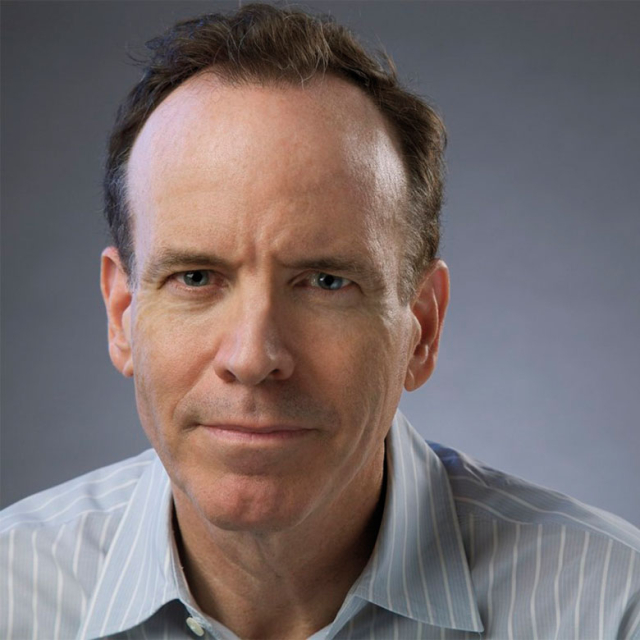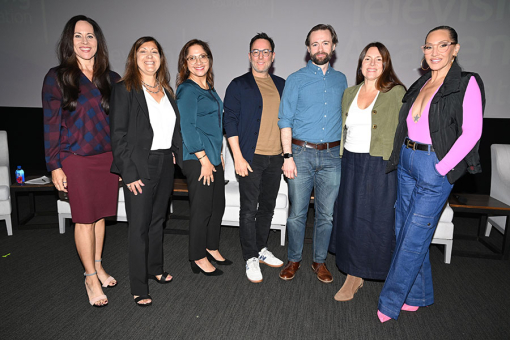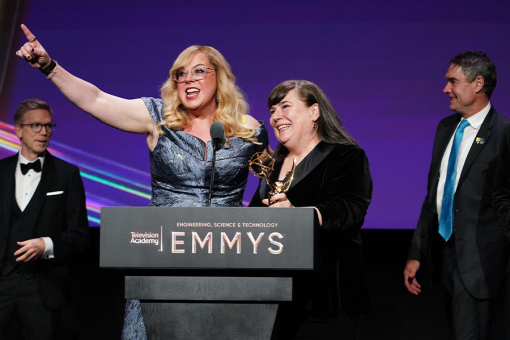Veteran producer Jonathan Murray has always championed diversity in his casts, from Latino AIDS activist Pedro Zamora on MTV's The Real World to the young adults with Down syndrome on A&E's Born This Way.
But a few years ago, he realized that his beloved television genre needed to look beyond casting to another important aspect of this issue — inclusion behind the camera. Few, if any, of the crew members he worked with resembled the cast members baring their souls on camera.
With his late production partner Mary-Ellis Bunim, Murray is considered the founder of reality television; together, they launched the pioneering series The Real World in 1992.
In addition to serving as an executive consultant to Bunim/Murray Productions, he is also vice-chair of the Television Academy Foundation. So, he approached the Foundation to see if he could build on its longtime summer internship program to improve the status quo in unscripted television.
Many meetings and two pilot programs later, the Foundation announced in January the launch of its Diversity and Inclusion Unscripted Internship Program, which offers Los Angeles–area college students from disadvantaged backgrounds the opportunity to work in reality television and learn the creative and business skills necessary for success.
Eight-week internships will be offered to five students this summer; graduating seniors from Los Angeles, Orange, Riverside, Ventura and San Bernardino counties may apply between April 7 and May 5. The program will be virtual due to the Covid-19 pandemic; available slots will focus on development, production and editing.
Five donors — who collectively contributed $1 million — made the program possible.
In addition to Murray, they include Jim Berger, chairman of High Noon Entertainment and strategic advisor for ITV; Rasha and Stephanie Drachkovitch, the married cofounders and co-CEOs of 44 Blue Productions; and Cris Abrego, chairman of the Americas for Banijay and president–CEO of Endemol Shine Holdings as well as chair of the Television Academy Foundation.
Abrego can speak from personal experience about the challenges faced by young people from underrepresented communities looking to break into the business. He was raised in El Monte, a tight-knit, working-class town not known as a resource for the industry.
"I grew up 24 miles from Hollywood, and it might as well have been 3,000," says Abrego, who leads operations in North America and Latin America for the companies behind such shows as Big Brother, MasterChef and The Real Housewives of Atlanta.
"I could not get hired in this town," he recalls of his career beginnings. "I was losing out on jobs to people from Ithaca, from NYU, from schools that had strong internship programs. The proximity wasn't the challenge — it was the access. And that's what this program does: it gives people access."
Coincidentally, the young Abrego finally found access at Bunim/Murray, where he was hired as a tape logger for the MTV reality game show Road Rules. Not long after he'd started, however, the producers decided to film in Mexico. They needed somebody who could speak Spanish. He was promoted to coordinator, hit the road with the crew and never looked back.
Now, L.A.–area students who are committed to promoting the voices and stories of underrepresented communities in the unscripted genre can turn to the Foundation's internships, says Foundation chief development officer Karla Pita Loor. "Our priority is placing interns in jobs that lead to executive-level roles in storytelling, that have the highest chance of advancement and full-time employment."
The launch follows on the heels of two pilot programs, in which participants learned how to pitch a project, attended development meetings and worked on editing, camera and sound equipment; one also worked in casting.
The Foundation partnered with the Cal State University Entertainment Alliance to choose students for the pilot programs, which were hosted by the companies of the founding donors. At the conclusion of the internships — which were performed in person in fall 2019 and remotely in summer 2020 — most interns were hired full-time by their host firms.
Rasha Drachkovitch, whose company is behind series such as Lockup and Wahlburgers, recalls that, when interviewing candidates, he found himself unexpectedly affected by what he heard.
"Their backstories were heartfelt and emotional," he says, citing one student whose mother had to work three jobs to support the family. "We told them, 'We're really thrilled that we have opportunities for you.'" Adds Stephanie: "The industry needs these voices. We try to tell a wide range of stories that reflect real life. The best way to do that is by connecting with things that people can relate to."
The unscripted genre needs diversity, adds Berger, whose company produces shows such as Fixer Upper and Cake Boss. "Reality television offers the ability to peer into new worlds, new lives," he says. "There are so many worlds out there to be explored. I see this program as a great opportunity to bring that to audiences."
Murray says he's pleased with the results of the pilot programs, appreciative of the participation and support of the Foundation — and hopeful that other unscripted producers will donate and host. "We've found a great path to increasing the pipeline of young people in the industry who normally might not have that path," he says.
A student who interned in development at ITV America during the pilot program confirms that assessment. "I was able to finish the program with great connections, who I keep in touch with," says Daniel Rivas, now a graduate of California State University, Los Angeles. "I was able to shadow and learn from professionals who gave me valuable insight into the industry.
"And working full-time allowed me to take on bigger and more meaningful projects than I could have in a part-time internship. I definitely feel more confident about what I have to offer future employers."
Helping students like Rivas — and the many who will follow him into the industry — is the goal of all involved,
Pita Loor says. "As we work to create a more equitable industry, we are grateful to our extraordinary founders and excited to bring new donors to the project. The young people who have already participated in our programs have had career-defining experiences that led directly to jobs. Their success is what this program is all about."
This article originally appeared in emmy magazine, Issue No. 2, 2021















